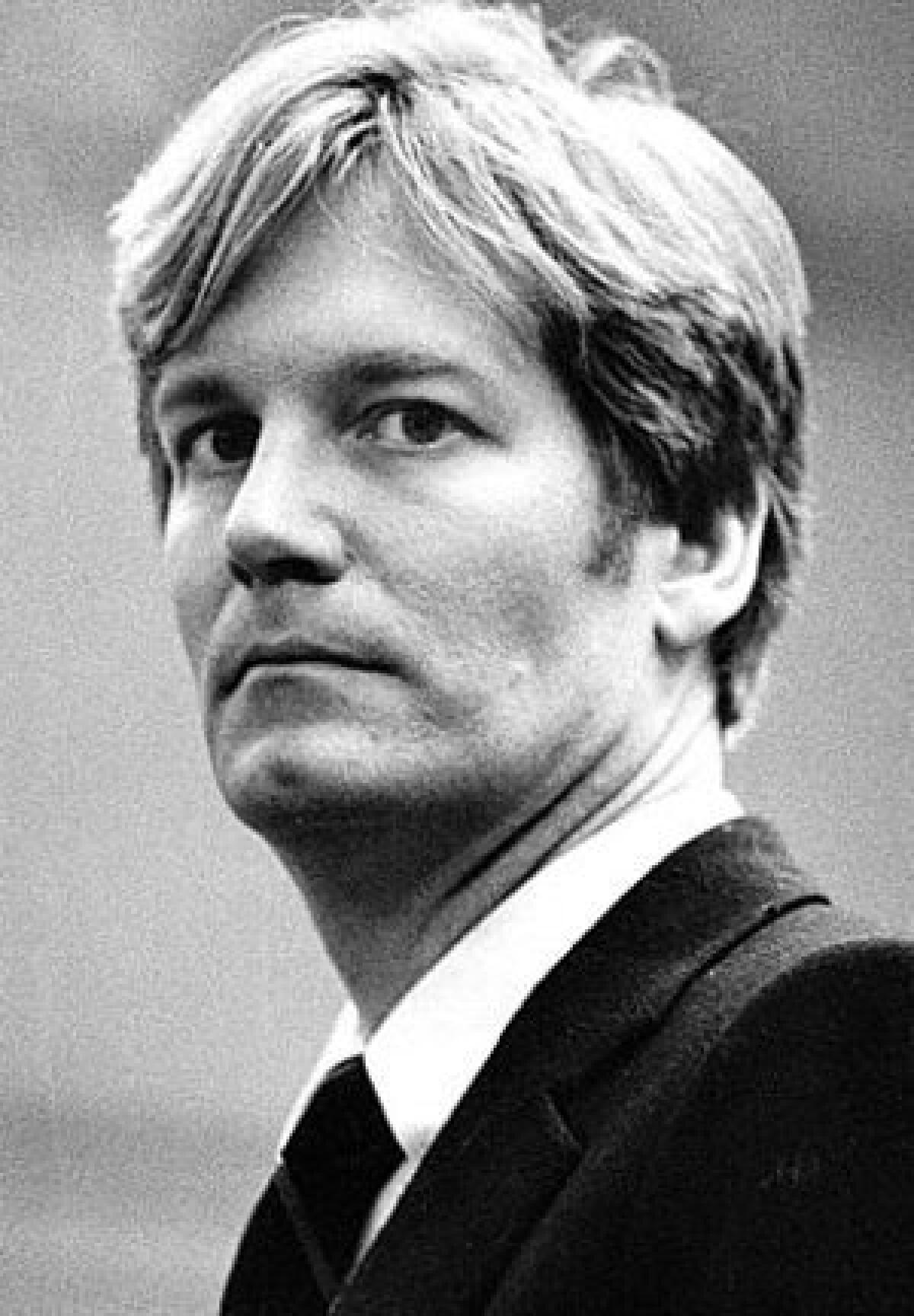Marc Christian MacGinnis dies at 56; Rock Hudson’s ex-lover

- Share via
Marc Christian MacGinnis, who won a multimillion-dollar settlement in 1991 from the estate of his ex-lover, actor Rock Hudson, after convincing a jury Hudson had knowingly exposed him to AIDS, has died. He was 56.
Known as Marc Christian, he died of pulmonary problems June 2 at Providence Saint Joseph Medical Center in Burbank. The details were confirmed Friday by his sister, Susan Dahl, who said she did not publicly announce his death earlier because of her brother’s wish for privacy.
Christian, who went by his mother’s maiden name, made headlines in 1985 when he sued Hudson’s estate and his secretary, Mark Miller, for $10 million, alleging that he had suffered severe emotional distress after hearing on a news broadcast that the former matinee idol and television star had AIDS, which was claiming lives throughout the gay community.
Hudson was diagnosed in 1984 but did not publicly acknowledge his illness until July 1985; he died three months later at age 59. Christian tested negative for acquired immune deficiency syndrome several times after learning of Hudson’s diagnosis but contended that the star put him at risk of contracting the disease by concealing his illness and continuing to have sexual relations with him. Christian included Miller in the suit because he said Miller lied to him when asked if Hudson had AIDS.
In 1989, a Los Angeles County Superior Court jury said Hudson had displayed “outrageous conduct” and awarded Christian $21.75 million in damages, later reduced to $5.5 million. The $5.5-million award was upheld by a state Court of Appeal, which called it just compensation for the “ultimate in personal horror, the fear of slow, agonizing death.”
After the California Supreme Court, citing requests from both sides in the dispute, decided not to hear the case, a private settlement was reached for an amount Christian later said was less than $6 million.
He was portrayed by Hudson estate lawyers as a gold-digging hustler and criticized in the gay community, which at the time had little understanding of the need for sexual responsibility.
“It was obviously a groundbreaking case,” said Tammy Bruce, a former president of the National Organization for Women’s Los Angeles chapter and an openly gay conservative talk-show host. “It was the first public acknowledgment that gay relationships are complicated, important, and that responsibility is attached to them. . . . A lot of people owe a great deal to that man and the way he handled it with particular grace, not only at the trial but in the years afterward.”
Several years after the sensational case ended, Christian told People magazine that his purpose was “not to sleaze Rock. It was to say that if you have AIDS, you ought to tell your partner, whether you’re a movie star or a postman.”
He later often found himself defending Hudson’s reputation against those who viewed the late actor’s conduct as reprehensible. “You can’t dismiss a man’s whole life with a single act. This thing about AIDS was totally out of character for him,” Christian said in the People interview.
Christian was born in Hollywood on June 23, 1953, and grew up in Orange County. After graduating from Villa Park High School, he attended Cal State Fullerton, where he earned a business degree.
After college, he worked as a waiter and learned about sound engineering, his sister said. He was interested in acting, but his two greatest passions were music and politics.
Christian met Hudson in late 1982 at a fundraiser for then-senatorial candidate Gore Vidal.
“I heard this voice, ‘Where the hell’s the booze?’ I turned and saw Rock Hudson standing next to me,” he testified in 1989.
He and Hudson became lovers about five months later. By late 1983, they were living together in Hudson’s Beverly Hills mansion.
When Hudson began losing weight and looking ill, he told Christian, who was about 27 years his junior, that he was merely dieting; later, associates said he was anorexic.
Christian said he learned the true cause of his partner’s increasing gauntness the way the rest of the world did -- from a 1985 television broadcast from Paris, where Hudson had flown to seek treatment for AIDS.
“I thought I was a dead man,” Christian recalled thinking at the time.
He tested negative for the disease after several tests. Told by medical experts that the best treatment would cost $100,000 a year with a life expectancy of three years, he approached Hudson’s managers after the actor’s death and asked them to place $300,000 in a trust fund to cover his care if he developed AIDS, with the funds returning to the estate if he remained AIDS-free.
When the managers turned him down, “That’s when he went to Marvin Mitchelson,” the famous palimony attorney who filed the lawsuit against Hudson’s estate, said Brent Beckwith, who was Christian’s lover and best friend for nine years.
After the settlement, Christian bought and renovated a mid-century modern house in the Hollywood Hills, filling it with his collection of musical instruments, antique Edison phonographs and tens of thousands of vintage 78s, LPs and CDs. He restored old recordings and was famous among friends for his ability to name almost any tune.
Contrary to Internet reports that said he had died of drug abuse or AIDS, which he never developed, Christian’s death was the result of his heavy smoking, which began in 1998, “the day he found out Frank Sinatra died,” Dahl said. “He loved Frank Sinatra.”
More to Read
Start your day right
Sign up for Essential California for the L.A. Times biggest news, features and recommendations in your inbox six days a week.
You may occasionally receive promotional content from the Los Angeles Times.







